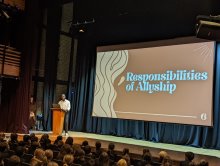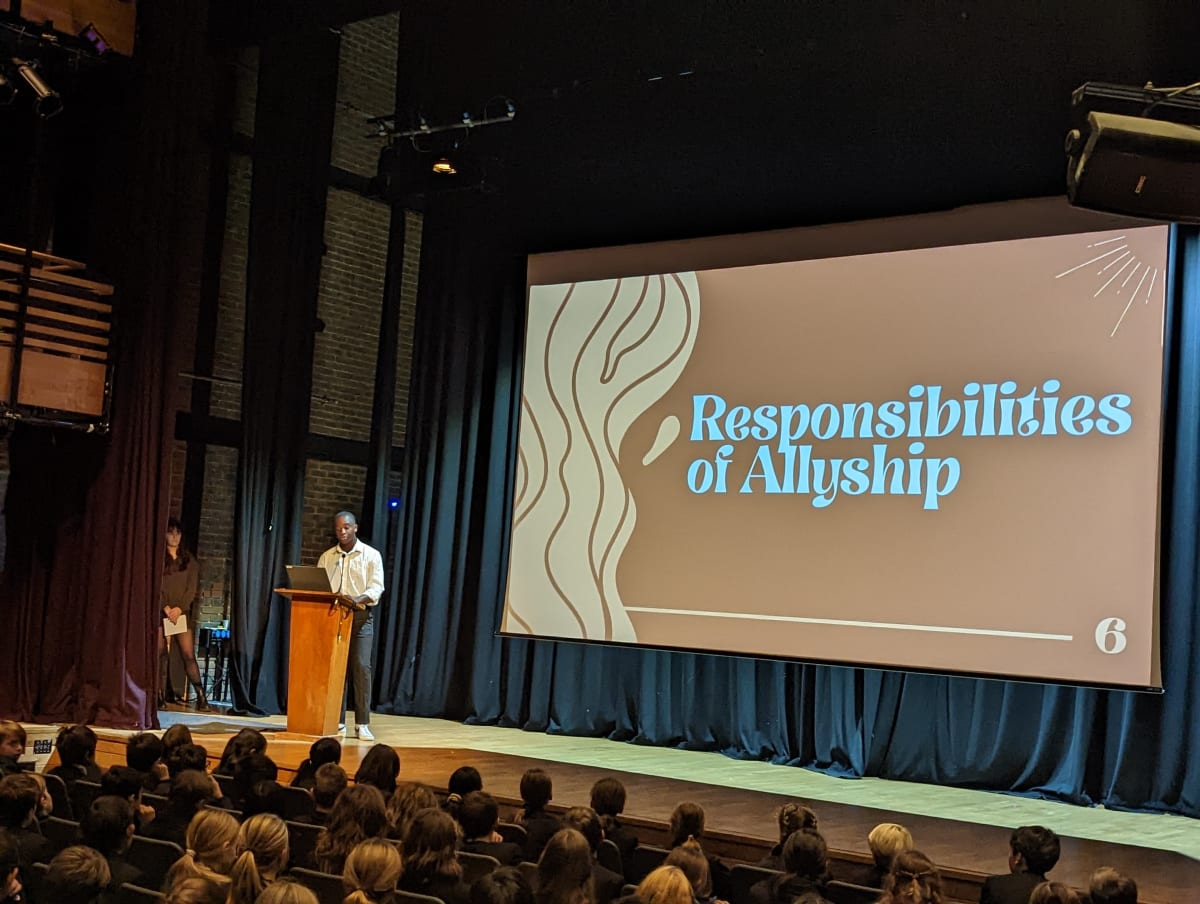






The following copy is a transcript of an assembly given by Upper School student representatives, Niamh, An Qi, Lauren and Nana-Yaw from the Minority Student Union (MSU) to Lower School pupils.
Black History Month is every October for us in the UK. It’s a time to acknowledge and celebrate the black community and how they have contributed to the UK overall. We also take this month to learn and reflect on the history of black people, their culture, and heritage. This month was first established in the UK in 1987 by Akyaaba Addai Sebo who followed in the footsteps of the civil rights movement in the US (where Black History Month had been established in 1969). It was established in the UK to combat racism, raise awareness for British history not taught in schools and to create a sense of identity for black people in the UK.
To start us off, we’ve collated a few facts for a quiz on black history.
Can anyone answer which invention was created by George Crum? Was it a) almond milk, b) ketchup, c) potato chips or d) plastic cups?
Raise your hands if you think it was a)… b)… c)… d)… - correct answer C
Which invention was created by Garrett Morgan? A) Modem traffic lights, b) the barbell, c) the escalator or d) gel insoles?
Raise your hands if you think it was a)… b)… c)… d)… - correct answer A
Which of these popular inventions were created by Black inventors? A) The automatic car, b) automatic elevator doors, c) CCTV or d) the electric microphone?
Raise your hands if you think it was a)… b)… c)… d)…
Trick question! They were all created by black people. This just goes to show how black achievements are looked over by the history.
When you think of Black history, what are the first things that come to mind? Now, a lot of you may have thought about the transatlantic slave trade, or maybe you thought about historical figures such as Martin Luther King Jr, or Rosa Parks. Although these all make up a significant part of Black history, today I want to focus more locally on black British history – specifically in London. Last Sunday, a few members of the MSU, me included, attended a Black History Bus Tour led by S.I Martin and Tony Warner. We visited local areas such as Battersea, Brixton, and Hyde Park Corner, and discovered the untold tales of the Black British diaspora.
Driving past Clapham Common, we learned that it was the home of the ‘Clapham Sect’ – a group of social reformers who called for the abolition of slavery. It was led by William Wilberforce who took charge of the parliamentary campaign against the British slave trade for two decades until the enactment of the ‘Slave Trade Act of 1807’ which prohibited the slave trade in the British Empire.
Turning the corner, we saw Clapham South station, and learned about the routes that many of the first generation of Windrush arrivals of 1938 had walked by foot in search of work at what were called ‘labour exchange stations. 492 of the (mostly Jamaican) men on the Windrush, who did not have addresses or accommodation, would stay in deep bomb shelters which are still dotted around the Clapham area to this day.
This is just one area of London that we explored on the tour, and already we had gained immense knowledge, and a greater understanding, of the black history right under our nose. I encourage all of you, in celebration of Black History Month, to learn something new about the black British diaspora in London.
The key to respecting black cultures and history, not just this month but all year round, is understanding that every single person in our community has a responsibility to our fellow black communities. We have a responsibility to educate ourselves and to deepen our understanding of the systemic racism and struggles that black people face in their day-to-day lives.
Showing solidarity with black communities is so important. This involves recognising your privilege and the advantages and opportunities that may come easier to you than to your black peers. It involves taking steps to make sure you support those who suffer at the hands of white privilege and systemic racial hierarchies in our society. We must use any of our privileges for good by amplifying the voices of black people. All of these are fundamental aspects of allyship to black communities.
It is our responsibility to confront any racial injustices and microaggressions we see in order to educate not just yourself but the people around you too. As you all know, racism comes in various forms, and if you are ever a witness to someone being discriminated against because of their race, it is your job to speak up. There is always something you can do to combat racism.
Finally, this Black History Month I strongly recommend each of you take some time to better your understanding and further educate yourselves on black history and culture by doing some research or extra reading, coming to weekly meetings at the Minority Student’s Union, even just staying up to date with the news, and to always remain appreciative and respectful of black communities.
I think its only over the past 3 years that I have truly began to embrace and love my blackness. Something clicked, and I stopped trying to fight the culture and skin I’d been born into. I wore my blackness and African heritage as a badge of honour, something that has forged me into the person I am today, rather than a detriment which signified my difference to those around me. The change in my introspective feelings on my race mirrored my outwards feelings on black excellence. I began seeing black historical and present achievements not as exceptions from the norm or something to be pitied for the difficulties they had to fight. No. I saw it as excellence, true excellence in their ability to be strong and let the colour of their skin fuel their fire for success. Their fire to change the world around them. I am trying to light and grow that fire within myself. In my eyes, blackness is culture and blackness is strength.
During the bus tour, Mr Martin talked about major movements of black liberation during the last 2 centuries. He said the defining movement of the 19th century was emancipation of slaves and abolition of slavery. The 20th century was defined by the Pan-Africanism and the civil rights movements. After saying this, he posed an open-ended question to us: “What will the movement of the 21st century be?” To me, the future of global race relations is the fight for socio-economic equity, the struggle to create a truly equal society free from the institutionalised racism and discrimination that has cocooned both black people and all protected groups. We, our generation, must do this by ensuring that those who have been historically wronged are paid recompense and given opportunities that will level the playing field, leading to a harmonious and fair world.
Thank you so much for listening to our talk, and we hope you’ve recognised the importance and significance of Black History Month. There have and will be lots of events happening around school to celebrate this month that you will hear about. MSU is next week in room EA11 at 1:25 so come along! It’s both perspective-changing and lots of fun. Have a wonderful day Lower school.
